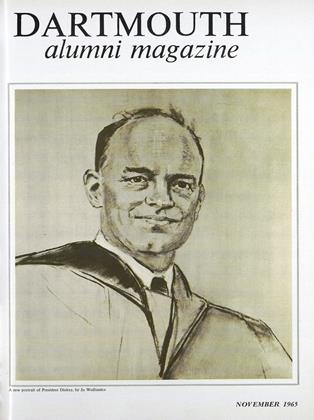Changes in student life at Dartmouth in the past twenty years have developed primarily through student initiative guided and encouraged by faculty and administration, through new programs and procedures introduced after extensive studies, and through the imaginative use of new facilities.
The academic honor code, instituted by majority vote of the student body three years ago and touching on all areas of the College experience in the classroom and outside, is one of the most important changes. Similarly, the students voted in 1954 an end to nationally imposed fraternity membership restrictions based on race, religion, or national origin.
The Undergraduate Council, established in 1947 to direct an enlarged program of student self-government, has grown steadily in its capacity for responsible leadership. Only this fall that organization's Judiciary Council was voted new freedom and responsibility in dealing with the student disciplinary cases that normally come under its jurisdiction.
In 1951 the William Jewett Tucker Foundation was established to provide a focus and give new emphasis to Dartmouth's moral and spiritual purpose, and such programs as this fall's "Self versus Society" series give continuing evidence of the Tucker Foundation's importance. The Hopkins Center, although very much an instructional facility, has also brought great changes in the patterns of Dartmouth life. The arts, formerly far removed from the mainstream of student daily living, are now invitingly in view. The Hopkins Center's role as an important social facility is readily apparent on any weekend, including during the summer.
Student living conditions also have been studied, experimented with, and changed. All sophomores, as well as all freshmen, began to eat in Thayer Hall in 1956, and different concepts in making dormitory living more conducive to learning were tried in the four Choate Road dormitories with their social rooms and resident faculty families and in the design of the three Wigwam living halls. The Cutter-North Experiment, sponsored by the Public Affairs Center, brings together students of public affairs and government - one third of whom are foreign students - in a creative dormitory living experience.
A reorganized intramural athletic program that brought more students into a score or more competitive programs was a less dramatic change, as was the decision to place Dartmouth's participation in intercollegiate athletics under the direct supervision of the President and Trustees, but both had a positive effect. The same could be said for the new approaches in administration - fraternity relationships, the strengthening of the Interdormitory Council's role, and the added attention given to the extracurricular organizations, some of whom have been hard pressed in the competition for the time undergraduates can spare from their studies.
 View Full Issue
View Full Issue
More From This Issue
-
 Feature
FeatureGraduate Study—Past and Present
November 1965 By PROF. LEONARD M. RIESER '44, -
 Feature
FeatureThe Conscience of Liberal Learning
November 1965 -
 Feature
FeatureAn Exciting 20-Year Forward March
November 1965 -
 Feature
FeatureDartmouth's First Lady
November 1965 By MARGARET BECK McCALLUM -
 Feature
FeatureCHAIRMAN'S REPORT 1964-1965 CAMPAIGN
November 1965 By Rupert C. Thompson, Jr. '28 -
 Feature
FeatureFishing the Grant with John Dickey
November 1965 By EDWARD WEEKS, LITT.D. '50,







